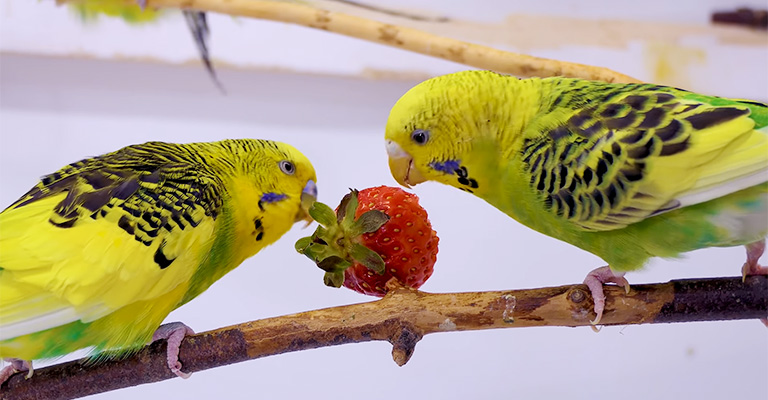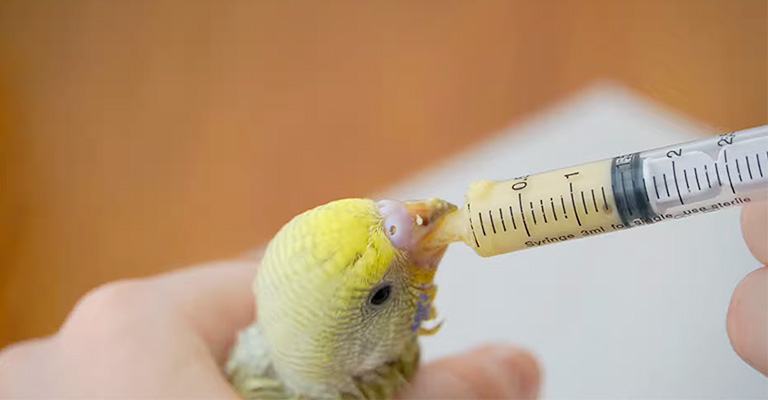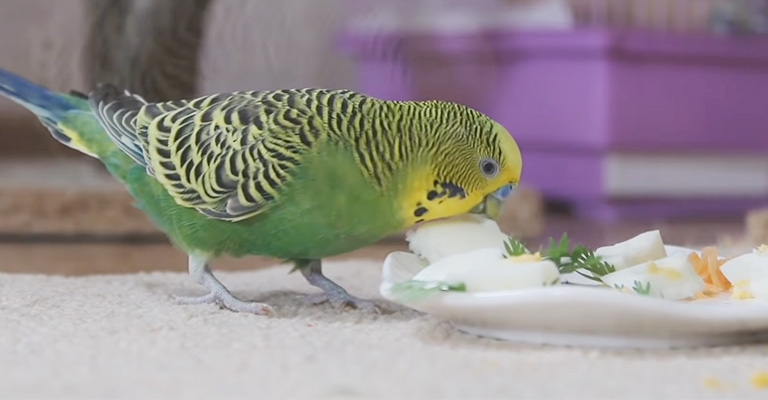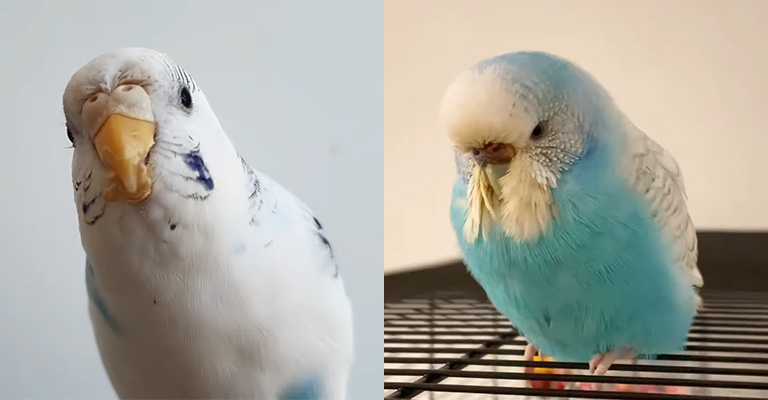Molting is a natural process that occurs in birds when they shed old, worn-out feathers and replace them with new ones. During this time, it is crucial to provide your molting bud with the right nutrition to support feather growth and overall health.
In this article, we will explore what to feed a molting budgie and the essential dietary considerations for feeding a molting bud.

What to Feed a Molting Budgie?
If your pet budgie is molting, here’s what you can do to keep it healthy and happy:
A Balanced Diet
A molting bud requires a well-rounded and balanced diet to ensure proper feather development. Incorporate a variety of foods, including high-quality commercial budgie pellets, fresh fruits, vegetables, and seeds.
Pellets should make up the majority of the diet, as they contain essential vitamins, minerals, and nutrients. However, it’s important to offer a mix of fresh foods for added variety and enrichment.
Protein-Rich Foods
Feathers primarily consist of protein, so providing your molting bud with adequate protein is crucial. Offer protein-rich foods such as cooked eggs (scrambled or boiled), small amounts of lean cooked chicken or turkey (without seasoning), or cottage cheese.
These protein sources will aid in feather growth and ensure healthy plumage.
Vitamin and Mineral Supplements

Supplements can play a significant role in supporting your budgie’s molting process. Consult with an avian veterinarian to determine if your budgie requires any additional vitamins or minerals.
Common supplements for molting birds include Vitamin A, Vitamin D3, and calcium. Remember, it’s essential to follow your vet’s recommendations and not overdose on supplements, as excessive amounts can be harmful.
Hydration
Proper hydration is vital during molting. Ensure your budgie has access to clean, fresh water at all times. You can also provide a shallow dish of water for your budgie to bathe in, as this can help soothe itchy skin and remove debris from the feathers.
Avoid Harmful Foods
Certain foods can be harmful or toxic to budgies, so it’s crucial to avoid them altogether. Avoid feeding your molting bud avocado, chocolate, caffeine, alcohol, sugary foods, salty foods, and any food that contains onions or garlic.
These items can be toxic and potentially harmful to your budgie’s health.
Consideration for Individual Needs
Every budgie is unique, and individual dietary needs may vary. Factors such as age, health condition, and personal preferences should be taken into account when planning your budgie’s diet during molting.
If you are unsure about specific dietary requirements, consult with an avian veterinarian who can provide tailored guidance.
Why Does Molting Affect a Budgie’s Diet?

Molting affects a budgie’s diet because the process of growing new feathers requires additional nutrients and energy. Feathers are primarily composed of protein, so during molting, a budgie’s nutritional needs shift to support the development of new feathers and maintain overall feather health.
Here are a few reasons why molting affects a budgie’s diet:
Increased Protein Requirement
Feathers are made up of keratin, a protein substance. During molting, budgies require higher amounts of protein to support the growth of new feathers.
Protein-rich foods such as pellets, eggs, cooked chicken or turkey, and cottage cheese provide the essential amino acids needed for feather development.
Nutrient Requirements
Feathers require specific vitamins, minerals, and nutrients for healthy growth. Essential vitamins include Vitamin A, which promotes feather health and vision, and Vitamin D3, which aids in calcium absorption for a strong feather structure.
Molting budgies may benefit from additional vitamin and mineral supplements to ensure they receive adequate nutrition during this demanding phase.
Energy Expenditure
Molting can be physically taxing for budgies. Growing new feathers requires energy and a budgie’s metabolic rate increases during this period.
To support their increased energy needs, budgies may require a diet that provides an appropriate balance of carbohydrates and fats.
Feeding Preferences
During molting, budgies may experience some discomfort and itchiness due to the shedding and growth of feathers. This can affect their appetite and eating habits. Some budgies may show a decreased interest in food, while others may increase their food intake.
Providing a varied and enticing diet can help maintain their appetite and ensure they receive proper nutrition.
It is important to adjust a budgie’s diet during molting to meet its specific nutritional requirements. Consulting with an avian veterinarian can help determine the best feeding plan for your budgie during this period and address any individual dietary needs they may have.
Is Budgie Molting or Sick? How To Tell

It can sometimes be challenging to distinguish between a molting budgie and a sick budgie, as there can be overlapping signs and symptoms. However, there are some key indicators that can help you differentiate between the two.
Here are some factors to consider when determining if your budgie is molting or sick:
Feather Appearance
Molting budgies will have visible signs of feather loss and regrowth. You may notice feathers scattered in the cage or around the bird, and the bird’s plumage may appear unkempt or patchy.
In contrast, a sick budgie may have feathers that appear ruffled, dull, or greasy. Feather abnormalities, such as excessive flaking, discoloration, or bleeding, could indicate a health issue.
Behavior and Activity Levels
During molting, budgies may exhibit some behavioral changes, such as increased preening, scratching, or irritability due to the discomfort of growing new feathers.
However, they should generally remain active, and vocal, and continue to engage in their usual activities. If your budgie is lethargic, weak, or shows a significant decrease in activity levels, it could be a sign of illness.
Eating Patterns
While molting budgies may have fluctuations in their appetite, they should generally maintain their interest in food and consume adequate amounts to meet their nutritional needs.
A sick budgie, on the other hand, may exhibit a loss of appetite, have difficulty eating, or show changes in their droppings (e.g., diarrhea or changes in color and consistency).
Respiratory Symptoms
Respiratory problems, such as wheezing, coughing, sneezing, or nasal discharge, are indicative of a potential illness. These symptoms are not typically associated with molting and may require veterinary attention.
Overall Condition
Assess your budgie’s overall condition and appearance. A molting budgie will typically maintain a healthy body weight, have bright and alert eyes, and show no signs of physical distress. A sick budgie may exhibit weight loss, fluffed-up feathers, abnormal posture, or other visible signs of distress.
If you are unsure whether your budgie is molting or sick, it is always best to consult with an avian veterinarian. They can provide a professional evaluation, diagnose any underlying health issues, and recommend appropriate treatment if necessary.
Regular veterinary check-ups are essential to ensure the well-being of your budgie.
Do Budgies Eat More When Molting?
The eating habits of budgies can vary during the molting period. While some budgies may eat more, others may eat less or maintain their regular food intake. Here are a few factors that can influence a budgie’s eating habits during molting:
Increased Nutritional Needs
Growing new feathers requires additional nutrients and energy. Budgies may instinctively increase their food intake to meet these increased nutritional demands during molting.
Feather Discomfort
Molting can be an uncomfortable process for budgies as old feathers shed and new ones emerge. Some budgies may experience itching or sensitivity during this time, which can affect their appetite. They may eat less or become more selective with their food choices.
Individual Differences
Each budgie has its own unique personality and preferences. Some budgies may be naturally voracious eaters and continue to eat heartily during molting, while others may have a more reserved appetite.
Stress Factors
Factors such as changes in the environment, handling, or other stressors can influence a budgie’s eating habits. If a budgie feels stressed during molting, it may impact their appetite, leading to changes in food consumption.
It is important to monitor your budgie’s eating habits during molting and ensure they have access to a balanced and nutritious diet. Providing a variety of foods, including pellets, fresh fruits, vegetables, and protein sources, can help meet their nutritional needs.
If you notice significant changes in your budgie’s eating habits, it is advisable to consult with an avian veterinarian to rule out any underlying health issues or concerns.
FAQs
While seeds can be a part of your molting budgie’s diet, relying solely on seeds is not recommended. Seeds lack certain essential nutrients and can lead to nutritional deficiencies.
It is important to incorporate a variety of foods such as pellets, fresh fruits, vegetables, and protein sources to ensure a balanced and nutritious diet for your molting budgie.
Yes, certain fruits and vegetables can provide additional nutrients and variety to your molting budgie’s diet. Good options include leafy greens (such as spinach or kale), carrots, broccoli, bell peppers, apples, grapes, and melons.
Remember to wash fruits and vegetables thoroughly and remove any seeds or pits before offering them to your budgie.
Providing calcium supplements during molting may be beneficial, as calcium is essential for healthy feather growth.
However, it is best to consult with an avian veterinarian before adding any supplements to your budgie’s diet. They can assess your budgie’s individual needs and recommend the appropriate dosage and duration for calcium supplementation.
It is important to provide clean, fresh water for your molting budgie every day. Change the water at least once or twice a day to ensure it stays clean and free from contaminants.
Additionally, if your budgie enjoys bathing, offer a shallow dish of water for them to bathe in regularly, as this can help with feather maintenance and comfort during molting.
Occasional treats can be given to your molting budgie, but it is crucial to choose healthy options in moderation. Avoid sugary or fatty treats and opt for small portions of safe foods like millet sprays, small pieces of fresh fruit, or a few unsalted seeds.
Remember, treats should only make up a small portion of your budgie’s overall diet to maintain a balanced and nutritious feeding routine.
Final Words
Now you know what to feed a molting budgie. Feeding a molting bud requires a balanced diet that is rich in nutrients, proteins, and essential vitamins.
Providing the right nutrition during this phase will support healthy feather growth and promote your budgie’s overall well-being.
Remember to consult with an avian veterinarian to address any specific dietary concerns or requirements. With proper nutrition and care, your molting bud will soon flaunt a beautiful set of feathers.